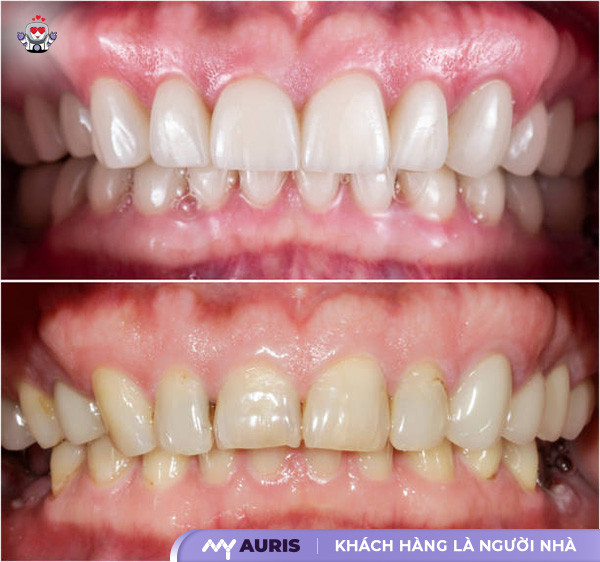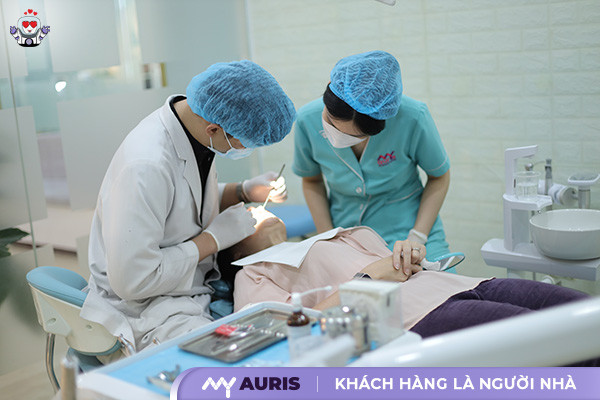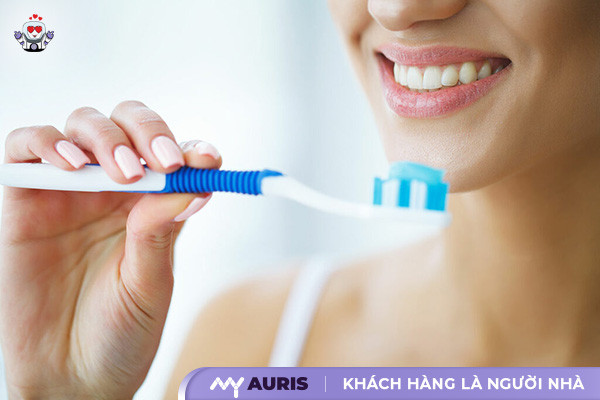Currently, two types of porcelain teeth that are popular in cosmetic restoration are metal porcelain teeth and Titanium porcelain teeth. These are popular options, meeting the need to improve aesthetics and chewing function. At My Auris dentistry, a team of experienced doctors will advise on the type of porcelain teeth that best suits each customer’s oral condition, ensuring long-term effectiveness and safety.
Pdistinguishing porcelain teeth Titanium and metal ceramic teeth
When considering the choice between metal ceramic teeth and Titanium ceramic teeth, it is important to understand the difference between the two. Each line of porcelain teeth has its own advantages and disadvantages, affecting durability, aesthetics and cost. Below are important factors to help you accurately distinguish metal ceramic teeth and Titanium.
Metal ceramic teeth: The frame is made from Chromium – Cobalt or Chromium – Nickel alloy, covered with a ceramic layer. Advantages: Lower cost than Titan porcelain teeth. Disadvantages: Metal easily oxidizes, causing blackening of the gum line, gum irritation, and metal allergy in some patients. The durability and aesthetics of porcelain teeth are also worse than Titanium porcelain teeth. Food sensing is poorer due to the metal layer blocking it. Average lifespan is lower.

Titanium ceramic teeth: Frame made from Titanium, covered with ceramic layer. Advantages: Titanium is a highly biocompatible dental material, has good porcelain tooth safety, and causes little gum irritation or metal allergies. Porcelain teeth have high aesthetics, natural color, do not oxidize porcelain teeth, and do not cause blackening of the gum line. High durability of porcelain teeth, longer lifespan. Better food sensing. Disadvantages: Higher cost than metal-ceramic teeth.

Compare metal porcelain teeth and porcelain teeth Titanium:
| Features | Metal ceramic teeth | Titanium ceramic teeth |
| Frame material | Chromium – Cobalt/ Chromium – Nickel alloy | Titanium |
| Aesthetics | Average, can have black edges gums | High, natural color |
| Durability | Average | High |
| Safety | May cause irritation and allergies | Safe, biocompatible good |
| Poor | Good | |
| Life expectancy | Low | High |
What is the current price of metal ceramic teeth, Titan porcelain teeth? much
The price of metal-ceramic teeth and Titanium-ceramic teeth depends on many factors:
- Dental materials: Metal-ceramic teeth use metal as a frame, covered with porcelain on the outside. The metal is usually a Nickel-Chromium or Cobalt-Chromium alloy. Titanium porcelain teeth use Titanium as a frame. Titanium is a high-quality dental material that is highly biocompatible with the body. The difference in materials directly affects the price. Prices vary, depending on dental technology, dentist’s skills, and quality of service. Reputable clinics that meet the standards of the Dental Association often have higher costs.
- Teeth: The number of teeth that need restoration also affects the total cost fake.
- Tooth position: Incisors require more aesthetics than molars, so the cost of restoring incisors may be higher.
Reference price list (Price may vary depending on the room). examination):
- Metal ceramic teeth: About 1,500,000 – 3,000,000 VND/tooth.
- Titan porcelain teeth: About 3,500,000 – 6,000,000 VND/tooth.
Notes to remember after covering metal porcelain teeth or Titan porcelain teeth
Tooth restoration with porcelain teeth, whether metal porcelain teeth or Titanium porcelain teeth, requiresAsk for special care to ensure longevity and oral health. Below are important notes after porcelain crowns.
Diet
After tooth restoration, diet directly affects the durability and longevity of porcelain teeth. Initially, teeth may be a little sensitive. Start with soft, liquid, easy-to-chew foods like porridge and soup. Avoid hard, chewy foods, foods that are too hot or too cold. Limit carbonated drinks, alcohol, coffee, and dark tea to avoid discoloring porcelain teeth. Chew on both sides of the jaw to distribute force evenly, avoiding putting too much pressure on porcelain teeth. Pay special attention to metal-ceramic teeth, avoid eating highly acidic foods to minimize the risk of metal corrosion. Eating properly helps protect porcelain teeth, maintain chewing function, and ensure oral health. Consult your dentist about a suitable diet.

Regular examination
Regular visits to the dentist are necessary after porcelain crowns, whether metal porcelain teeth or Titanium porcelain teeth. This helps the dentist check the condition of porcelain teeth and early detect problems such as chips, breaks, gingivitis, or other dental diseases. Regular check-ups are usually every 6 months, or as prescribed by your doctor. Regular examinations help maintain the longevity of porcelain teeth, ensure chewing function, and prevent complications. Don’t forget to make an appointment with your dentist to get the best dental care.

Clean your teeth properly
Proper oral hygiene is a decisive factor in the success of porcelain tooth restoration. Brush your teeth at least twice a day, using a soft-bristled toothbrush and fluoride toothpaste. Use dental floss to clean between teeth and remove plaque. Rinse your mouth with specialized mouthwash to kill bacteria and clean the oral cavity. Proper dental hygiene helps prevent plaque, bacteria, gingivitis, and protects porcelain and real teeth. Ask your dentist about the most effective oral hygiene method for your situation.
Chew both sides of the jaw
Chewing evenly on both sides of the jaw is an important habit after getting porcelain crowns. This helps distribute chewing force evenly on both jaws, avoiding overloading one side and affecting the durability of porcelain teeth. Chewing evenly also helps jaw muscles develop balance, avoiding jaw misalignment. Practice the habit of chewing evenly on both sides of your jaw to protect your porcelain teeth, maintain chewing function and oral health.





